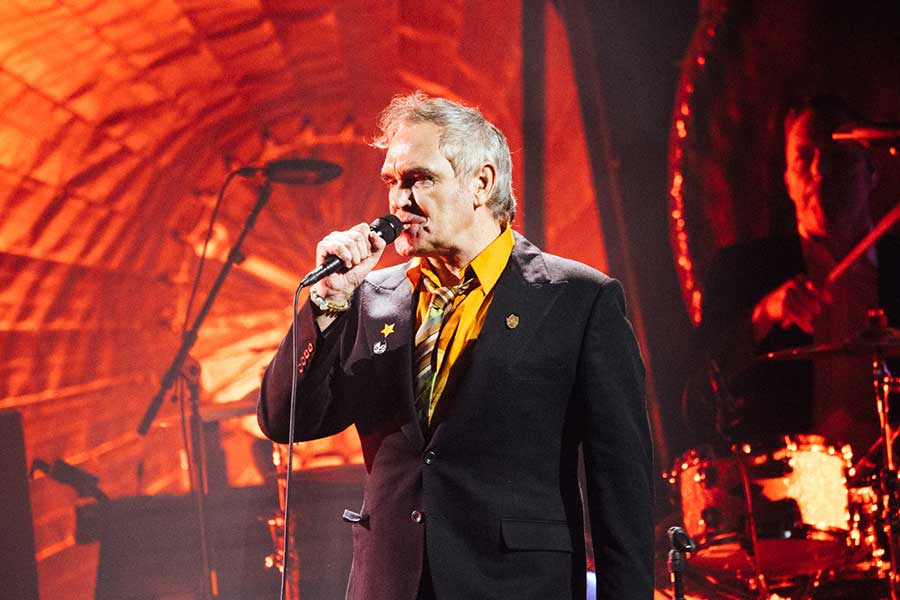One would imagine that, at age 60, Morrissey — Brit-pop’s patron saint of all things smartly smarmy, sexually obsessive, slyly sensitive and dramatic — might have tamed his theatrical side and tamped down his impulse to provoke his devoted audiences.
And yet on the stages of Camden’s BB&T Pavilion on Monday night, Morrissey — divine since fronting The Smiths from 1982-87, and still handsome, nattily dressed in a suit and loosely knotted tie — spent a large part of the evening quietly testing and subtly prodding his fans.
With a radically conflicted persona, Morrissey has always pushed hot buttons of gender and sexuality politics. As the frontman of The Smiths, he claimed to be celibate while referencing gay subculture on stage and in lyrics. Since going solo, he has called himself a “humasexual,” and he very briefly discussed relationships with men and women in interviews and his autobiography.
Morrissey has long been a reluctant poster boy for the LGBTQ-plus movement. On Monday, however, images including Lypsinka and a dancing, smiling James Baldwin were projected on the screen behind him, an apparent ode to the gay community.
Starting his long set with a raging version of The Smith’s still statuesque “How Soon Is Now,” Morrissey soon segued into searing solo classics like “Alma Matters” and a piquant take on “Hairdresser on Fire.”
The Smiths’ songs “That Joke Isn’t Funny Anymore” and the breathy “Everyday Is Like Sunday” were far less manicured in a live setting. These torrid tracks turned into tight psychedelic swirls and a dense jungle that his baritone croon punctured like an ice pick, respectively; he slowed “The Bullfighter Dies” to a heartbreaking pace.
The audience loved the opening set, waving bunches of flowers his way, eager to touch his hand at the lip of the stage. Even a cool, burly cover version of The Pretenders’ “Back on the Chain Gang” won favor.
One set of songs seemed to lose the audience, however — a grouping that seemed to embrace the left-leaning and LGBTQ values that Morrisey himself has often rejected.
Moz’s most recent album, “California Son,” features the king of Generation Whine covering rare protest songs and gender-bending anthems from the 1960s and ’70s. At the end of a decade of record-label snafus, bland albums, health problems, gig cancellations and right-wing extremist pin-wearing, “California Son” is a marvelous tonic to the troubles of his recent past. Morrissey hasn’t sounded this passionate — full of guts, guile and unbridled emotion — since 2004’s “You Are the Quarry.”
For a guy who rarely records other artists’ work, Morrissey sunk his teeth into the time period between 1964 and ’72 in “California Son,” with weird brio, rich melodramatics and full-blooded vigor — possibly a commentary on his present life, with a nod to the past.
On stage, Morrissey’s powerful and lustrous take on Laura Nyro’s “Wedding Bell Blues,” with its choir of carousels and lyrics — “Bill, I love you so / I always will” — seemed to confuse the crowd. Why was Morrisey singing an old Fifth Dimension song with quaint chamber pop choruses? Along with a tip-of-the-hat approval of same-sex marriage, Morrissey created his best-ever gay relationship paean, and I think the crowd missed it.
He cut into the grandly melodic “Lady Willpower” from Gary Puckett & the Union Gap and then delivered his version of the spaced-out chamber-glam hit “Morning Starship” from Pennsylvania glitter rocker Jobriath — after asking the audience, “Do you know who Jobriath is?”
Silence.
Morrissey hammed up his disgust but truly must have been more than a little disappointed that this hometown boy (well, at least a neighbor), a quiet icon of early ’70s gay glam rock, who all but died in obscurity, was not known to this audience. Nevertheless, he let loose with a lovely take on “Morning Starship,” allowing its tale of outer space wonder women to fly while his baritone voice found its highest registers. It was easy to see Morrissey loved this song, even if his crowd missed its full resonance.
